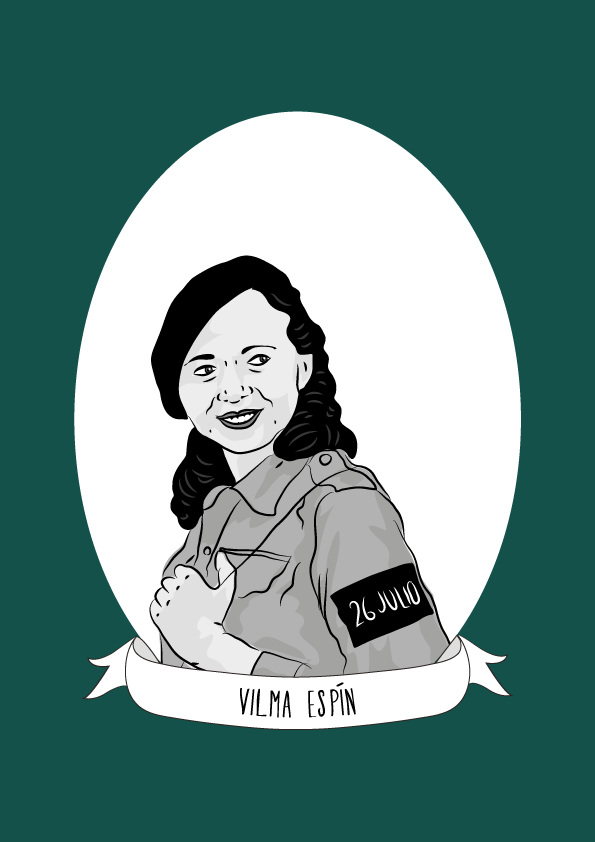Vilma Espín was a Cuban revolutionary, feminist, and chemical engineer. She was known as “Cuba’s First Lady” and was the most politically powerful woman in the country.
Espín was born in 1930 in Santiago, Cuba to Margarita Guillois and Jose Espín, the chief accountant and executive assistant to the CEO of the Bacardi rum company. Espín grew up at a time when most girls were not able to finish school, and one in three women were illiterate. She was able to defy the norms, and become the second woman in Cuba to study for, and achieve a degree in chemical engineering from the Universidad de Oriente, Santiago de Cuba. During her time at University, Espín spent her free time writing, printing and distributing information that criticised Batista, who had become president of Cuba following a coup in 1952. She was a member of Oriente Revolutionary Action (ARO), who were involved in planning an armed uprising in 1956.
In 1954, Espín travelled to the U.S. to continue her education at MIT in Cambridge, Massachusetts, where she conducted post-graduate work for a year. She had been encouraged to leave Cuba by her father, who feared for her safety should she pursue the revolutionary activities she had become involved in. Before her return to Cuba, Espín once again became involved in aiding the revolution, and was tasked with stopping in Mexico to meet with the Castro brothers who were living there in exile. Espín acted as a messenger, collecting information detailing their intentions to return to Cuba to defeat Batista.
Two years later, the Castro brothers and 82 others landed on the beaches of Oriente, after a battle against Batista’s military only 15 revolutionaries, Fidel Castro, Raúl Castro, and Che Guevara were left alive. They fled to the Sierra Maestra mountains, and Espín acted as a driver to transport recruits for the 26th July Movement to be trained in guerrilla warfare. She used her gender to conduct her duties undetected, as no one at the time would have expected a woman to take such an active role in the revolution. Espín was also a member of the Mariana Grajales Women’s Platoon, who made up Fidel Castro’s personal security and acted as a translator when American journalists travelled to Cuba to write about the rebel movement. The sight of Espín and the other members of the Platoon carrying rifles and wearing military fatigues helped to change attitudes towards women in Cuba, and empowered the women to seek success outside of the home.
In 1959, following the overthrow of Batista, Espín became the unofficial first lady of Cuba when Fidel Castro became Prime Minister. Four months later, she married his brother, Raúl. In 1960, she founded the Federation of Cuban Woman (FMC) and served as president of the organisation until her death, becoming an international figure in the struggle for women’s rights. The FMC set out to provide women with the opportunity to contribute to society, and in the early 1960’s, the FMC was involved with the National Literacy campaign, which reduce illiteracy from 23.6% to 2.9%. It also encouraged women to join the workforce, provided education on topics including basic hygiene, family planning and established night schools for domestic staff to continue their education after work. It also established maternity homes for women with high risk pregnancies.
In 1965, Espín was named as a member of the Communist Party’s ruling Central Committee, and was a part of the elite Council of State until her death. Espín was often tasked with representing Cuba at the United Nations General Assembly, and headed headed the Cuban Delegation to the First Latin American Congress on Women and Children in Chile in September 1959, as well as Cuban delegations to the Conferences on Women held in Mexico, Copenhagen, Nairobi and Beijing. In 2006, she became the official first lady after Fidel Castro ceded power to her husband, Raúl Castro. Espín died in 2007, and her children continue her work in improving the lives of those in Cuba, including her daughter, Mariela Castro, who currently heads the Cuban National Center for Sex Education and is committed to promoting women’s rights, LGBTQ equality and sexual health education.
